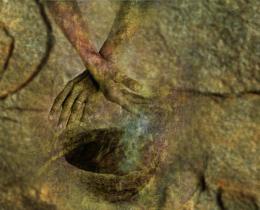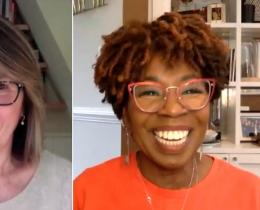Sometimes our relationship with our parents is strong and loving, yet we still find ourselves unable to explain the difficult feelings we carry. We often assume that the problem originates inside us, and if we only dig deep enough, we’ll discover its source. Until we uncover the actual triggering event in our family history, we can relive fears and feelings that don’t belong to us—unconscious fragments of a trauma—and we will think they’re ours.
Todd’s Story
Todd was nine when he began stabbing the couch with a pen. Within a year, he assaulted a neighbor boy with a stick, resulting in a gash that required 40 stitches. Todd spent the next several years receiving both medication and psychological treatment, yet the aggressive behaviors continued. It wasn’t until Todd’s father, Earl, told me about his own father—a man he said he loathed—that the missing piece of the puzzle emerged into view.
Todd’s grandfather was a violent man. Not only did he beat his children, he had also stabbed a man to death in a barroom brawl. Charges were never brought, and the grandfather remained free to live his life as he pleased. But not his descendants; Todd, his grandson, had become the unsuspecting recipient of violent feelings that weren’t his. He shared an unconscious connection with his grandfather, a connection that would have remained hidden had Todd’s father not probed into the family’s past.
In our session together, Earl revealed that his father’s father had also killed a man. And in the generation before that, his great-grandfather had been slain, along with several members of his family, by a land baron and his gang from the neighboring town. The pattern was now beginning to make sense. Earl began to see that his father was merely a cog in a spinning wheel of family violence.
With the lens widened, Earl felt, perhaps for the first time in his life, compassion for his father. He told me that he wished his father were still alive, so that he could talk to him about the family story. Earl went home and shared what he knew with Todd, who listened intently. Both of them knew intuitively that something in the telling and receiving would finally come to rest. That insight proved to be true. Five months later, Earl called me and told me that Todd was no longer on medication and no longer behaving violently.
If you are identified with someone in your family system, you are probably not aware of it. Identifications are unconscious, so it’s unlikely that you will make the link by yourself.
Megan’s Story
Megan married Dean at 19 and thought their relationship would last forever. Then one day, when Megan was 25, she looked at him across the kitchen table and felt herself go numb. Her feelings for Dean were gone. Within weeks, Megan filed for divorce. Realizing that her suddenly vanishing love for Dean seemed aberrant, she sought help.
I suspected that a family story lay out of reach for her and began to probe. It was fortuitous that we did.
The link Megan hadn’t made was easy to see. Megan’s grandmother was only 25 years old when her husband, the love of her life, drowned while fishing at sea. She raised Megan’s mother on her own and never remarried. Her husband’s sudden death was the great tragedy in their family. The story was so familiar that Megan hadn’t even considered its effects on her. Once Megan realized that she was reliving her grandmother’s story, the sudden aloneness, the deep loss and numbness, Megan began to blink and scrunch her face. I gave her all the time she needed to let the insight sink in. After many seconds came a series of quick breaths. A few minutes later, her breath began to lengthen. She was putting the pieces together. “I feel strangely hopeful,” she said. “I need to tell Dean.” Days later she called and reported that something was changing inside her; her feelings for Dean were returning.
It’s important to restate: not all behaviors expressed by us actually originate from us. They can easily belong to family members who came before us. We can merely be carrying the feelings for them or sharing them. We call these “identification feelings.”
Are you unconsciously identified with a member of your family system?
- Could you be feeling like, behaving like, suffering like, atoning for, or carrying the grief for someone who came before you?
- Do you have symptoms, feelings, or behaviors that are difficult to explain in the context of your life experience?
- Did guilt or pain prevent a family member from loving someone or grieving his or her loss?
- Did someone do something that caused his or her rejection in the family?
- Was there a trauma in the family (an early death of a parent, child, or sibling, or an abandonment, murder, crime, or suicide, etc.), an event that was too terrible, painful, or shameful to talk about?
- Could you be connected with that event, living a life similar to the person no one talks about?
- Could you be reliving this family member’s trauma as though it were your own?



